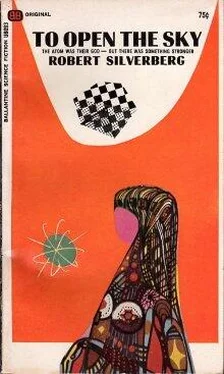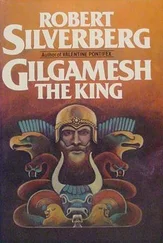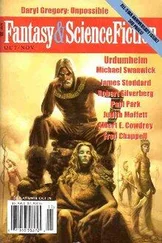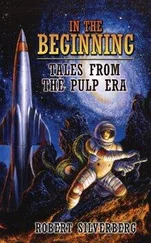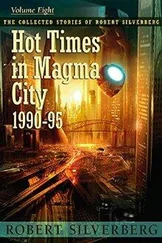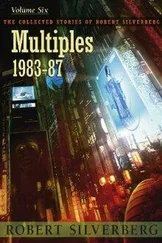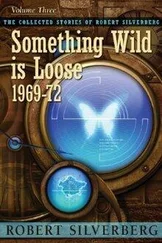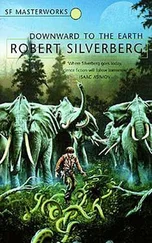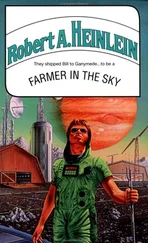Robert Silverberg - To Open the Sky
Здесь есть возможность читать онлайн «Robert Silverberg - To Open the Sky» весь текст электронной книги совершенно бесплатно (целиком полную версию без сокращений). В некоторых случаях можно слушать аудио, скачать через торрент в формате fb2 и присутствует краткое содержание. Год выпуска: 1967, Издательство: Ballantine Books, Жанр: Фантастика и фэнтези, на английском языке. Описание произведения, (предисловие) а так же отзывы посетителей доступны на портале библиотеки ЛибКат.
- Название:To Open the Sky
- Автор:
- Издательство:Ballantine Books
- Жанр:
- Год:1967
- ISBN:нет данных
- Рейтинг книги:5 / 5. Голосов: 1
-
Избранное:Добавить в избранное
- Отзывы:
-
Ваша оценка:
- 100
- 1
- 2
- 3
- 4
- 5
To Open the Sky: краткое содержание, описание и аннотация
Предлагаем к чтению аннотацию, описание, краткое содержание или предисловие (зависит от того, что написал сам автор книги «To Open the Sky»). Если вы не нашли необходимую информацию о книге — напишите в комментариях, мы постараемся отыскать её.
To Open the Sky — читать онлайн бесплатно полную книгу (весь текст) целиком
Ниже представлен текст книги, разбитый по страницам. Система сохранения места последней прочитанной страницы, позволяет с удобством читать онлайн бесплатно книгу «To Open the Sky», без необходимости каждый раз заново искать на чём Вы остановились. Поставьте закладку, и сможете в любой момент перейти на страницу, на которой закончили чтение.
Интервал:
Закладка:
“Brother Mondschein?” a pudgy acolyte asked.
“That’s right.”
“I’m Brother Capodimonte. I’m your escort. Got your luggage? Good. Let’s go, then.”
A teardrop was parked in back. Capodimonte took Mondschein’s lone suitcase and racked it. He was about forty, Mondschein guessed. A little old to be an acolyte. A roll of fat bulged over his collar at the back of his neck.
They entered the teardrop. Capodimonte activated it and it shot away.
“First time here?” he asked.
“Yes,” Mondschein said. “I’m impressed by the countryside.”
“It’s marvelous stuff, isn’t it? Life-enhancing. You get a sense of space here. And of history. Prehistoric ruins scattered all over the place. After you’re settled, perhaps we can go up to Frijoles Canyon for a look at the cave dwellings. Does that kind of thing interest you, Mondschein?”
“I don’t know much about it,” he admitted. “But I’ll be glad to look, anyway.”
“What’s your specialty?”
“Nucleonics,” Mondschein said. “I’m a furnace tender.”
“I was an anthropologist until I joined the Brotherhood. I spend my spare time out at the pueblos. It’s good to step back into the past occasionally. Especially out here, when you see the future erupting with such speed all around you.”
“They’re really making progress, are they?”
Capodimonte nodded. “Coming along quite well, they tell me. Of course, I’m not an insider. Insiders don’t get to leave the center much. But from what I hear, they’re accomplishing great things. Look out there, Brother—that’s the city of Santa Fe we’re passing right now.”
Mondschein looked. Quaint was the word that occurred to him. The city was small, both in area and in the size of its buildings, which seemed to be no higher than three or four stories anywhere. Even at this distance Mondschein could make out the dusky reddish-brown of adobe.
“I expected it to be much bigger,” Mondschein said.
“Zoning. Historical monument and all that. They’ve kept it pretty well as it was a hundred years ago. No new construction’s allowed.”
Mondschein frowned. “What about the laboratory center, though?”
“Oh, that’s not really in Santa Fe. Santa Fe’s just the nearest big city. We’re actually about forty miles north,” said Capodimonte. “Up near the Picuris country. Still plenty of Indians there, you know.”
They were beginning to climb now. The teardrop surged up hillside roads, and the vegetation began to change, the twisted, gnarled junipers and piñon pines giving way to dark stands of Douglas fir and ponderosas. Mondschein still found it hard to believe that he was soon to arrive at the genetic center. It goes to show, he told himself. The only way to get anywhere in the world was to stand up and yell.
He had yelled. They had scolded him for it—but they had sent him to Santa Fe anyhow.
To live forever! To surrender his body to the experimenters who were learning how to replace cell with cell, how to regenerate organs, how to restore youth. Mondschein knew what they were working on here. Of course, there were risks, but what of that? At the very worst, he’d die—but in the ordinary scheme of events that would happen anyway. On the other hand, he might be one of the chosen, one of the elect.
A gate loomed before them. Sunlight gleamed furiously from the metal shield.
“We’re here,” Capodimonte announced.
The gate began to open.
Mondschein said, “Won’t I be given some kind of esper scanning before they let me in?”
Capodimonte laughed. “Brother Mondschein, you’ve been getting a scanning for the last fifteen minutes. If there were any reason to turn you back, that gate wouldn’t be opening now. Relax. And welcome. You’ve made it.”
six
The official name of the place was the Noel Vorst Center for the Biological Sciences. It sprawled over some fifteen square miles of plateau country, every last inch of it ringed by a well-bugged fence. Within were dozens of buildings—dormitories, laboratories, other structures of less obvious purpose. The entire enterprise was underwritten by the contributions of the faithful, who gave according to their means—a dollar here, a thousand dollars there.
The center was heart and core of the Vorster operation. Here the research was carried out that served to improve the lives of Vorsters everywhere. The essence of the Brotherhood’s appeal was that it offered not merely spiritual counseling—which the old religions could provide just as well—but also the most advanced scientific benefits. Vorster hospitals existed now in every major population center. Vorster medics were at the fore-front of their profession. The Brotherhood of the Immanent Radiance healed both body and soul.
And, as the Brotherhood did not attempt to conceal, the greater goal of the organization was the conquest of death. Not merely the overthrow of disease, but the downfall of age itself. Even before the Vorster movement had begun, men had been making great progress in that direction. The mean life expectancy was up to ninety-odd, above one hundred in some countries. That was why the Earth teemed with people, despite the stringent birth-control regulations that were in effect almost everywhere. Close to eleven billion people now, and the birth rate, though dropping sharply, was still greater than the death rate.
The Vorsters hoped to push the life expectancy still higher for those who wanted longer lives. A hundred and twenty, a hundred and fifty years—that was the immediate goal. Why not two hundred, three hundred, a thousand later on? “Give us everlasting life,” the multitudes cried, and flocked to the chapels to make sure they were among the elect.
Of course, that prolongation of life would make the population problem all the more complex. The Brotherhood was aware of that it had other goals designed to alleviate that problem. To open the galaxy to man—that was the real aim.
The colonization of the universe by humankind had already began several generations before Noel Vorst founded his movement. Mars and Venus both had been settled, in differing ways. Neither planet had been hospitable to man, to begin with, so Mars had been changed to accommodate man, and man had been changed to survive on Venus. Both colonies were thriving now. Yet little had been accomplished toward solving the population crisis; ships would have to leave Earth day and night for hundreds of years in order to transport enough people to the colonies to make a dent in the multitudes on the home world, and that was economically impossible.
But if the extrasolar worlds could be reached, and if they did not need to be expensively Terraformed before they could be occupied, and if some new and reasonably economical means of transportation could be devised—
“That’s a lot of ifs,” Mondschein said.
Capodimonte nodded. “I don’t deny that. But that’s no reason not to try.”
“You seriously think that there’ll be a way to shoot people off to the stars on esper power?” Mondschein asked. “You don’t think that that’s a wild and fantastic dream?”
Smiling, Capodimonte said, “Wild and fantastic dreams keep men moving around. Chasing Prester John, chasing the North-west Passage, chasing unicorns—well, this is our unicorn, Mondschein. Why all the skepticism? Look about you. Don’t you see what’s going on?”
Mondschein had been at the research center for a week. He still did not know his way around the place with any degree of confidence, but he had learned a great deal. He knew, for example, that an entire town of espers had been built on the far side of the dry wash that cut the center in half. Six thousand people lived there, none of them oldcr than forty, all of them breeding like rabbits. Fertility Row, they called the place. It had special government dispensation for unlimited childbearing. Some of the families had five or six children.
Читать дальшеИнтервал:
Закладка:
Похожие книги на «To Open the Sky»
Представляем Вашему вниманию похожие книги на «To Open the Sky» списком для выбора. Мы отобрали схожую по названию и смыслу литературу в надежде предоставить читателям больше вариантов отыскать новые, интересные, ещё непрочитанные произведения.
Обсуждение, отзывы о книге «To Open the Sky» и просто собственные мнения читателей. Оставьте ваши комментарии, напишите, что Вы думаете о произведении, его смысле или главных героях. Укажите что конкретно понравилось, а что нет, и почему Вы так считаете.
